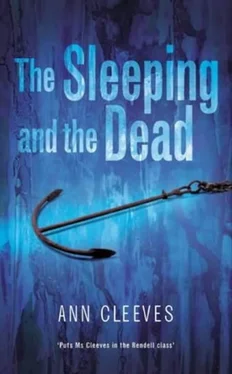‘Mr Reeves?’
There was no answer. He opened the right-hand door into a kitchen. A yellow roller blind covered the window, but let in enough light to show empty workbenches, a spotless tiled floor. There were no plates or cups draining by the sink and the dishcloth folded over the mixer tap was dry and hard. Porteous looked in the fridge. It had recently been defrosted and was empty.
‘He must have gone straight to bed,’ Stout said. He couldn’t stand still. He was fidgeting like a kid. ‘Let’s wake the bastard up.’
But Porteous shook his head. He went back into the hall and opened the opposite door into the living-room. The bay windows were covered by thick velvet curtains and it took his eyes a moment to adjust to the gloom. Stout came up behind him impatiently and switched on the light. The room was lit by two lamps on the walls. They had bulbs like imitation candles and heavy fringed shades. The central light was operated by another switch and didn’t come on, but it was a chandelier with similar fittings. It must have been more substantial than it looked, because it supported the weight of Alec Reeves, who hung by a noose of blue nylon rope, twisted around the chain which fixed the chandelier to the ceiling. A kitchen stool, overturned, lay on the floor beneath him.
Stout was about to go into the room but Porteous pulled him back.
‘There’s nothing we can do. It might be a crime scene.’ He wondered why he wasn’t more surprised. Had he been expecting this as soon as he realized the door was open?
‘What are you talking about? He knew we were on to him and he topped himself.’ Stout was almost weeping with frustration. This wasn’t the way it should have ended. He still had things he wanted to say to Mr Alec Reeves.
‘Perhaps.’
‘What do you mean, “perhaps”? He came in last night and killed himself.’
‘Why didn’t he lock the door?’
‘What!’ It came out as a scream.
‘Suicide. It’s a private thing. You wouldn’t want to be disturbed.’ Peter thought he was an expert. At the depth of his depression, he’d contemplated suicide in all its forms. Walking into the sea. Taking pills. Hanging. Jumping off a bridge like his dad. One of the things that had stopped him in the end was the possibility of an audience. The terrible embarrassment of being caught in the act.
Eddie was looking at him as if he were mad. ‘Maybe he just forgot.’
‘He wasn’t that sort of man. He was careful. He had a routine. And the key was in the lock on the inside of the door. He used it to get into the house, took it out and put it in on the inside. A deliberate act. Why didn’t he turn it then?’
‘Maybe he didn’t care.’
‘Oh, I think he cared.’
‘What are you saying?’
‘That I think he was murdered.’ He spoke quietly, apologetically. For thirty years Eddie had thought of this man as a monster, the human form of the devil he talked about in pulpits on Sundays. It was like expecting him to accept he’d got all the other Sunday stuff wrong too.
‘Why?’
‘I don’t think he killed Theo and Melanie. I don’t know about Carl. Perhaps not even him. I think we got it wrong.’
‘Not “we”!’ Eddie bellowed. A child having a tantrum. Wanting to be important, even if it meant taking the blame. ‘If anyone got it wrong it was me.’
‘We need the scene-of-crime team.’
‘Why was he murdered if he wasn’t involved?’
‘To make us think he was. If the house had a Yale lock we’d have been taken in by it. The murderer would have been able to pull the door to behind him and we’d never have known any different. The pathologist should throw some light.’ He paused, turned to Stout. ‘Look, I might be wrong. I’m just saying how I see it.’
‘No,’ Stout said. ‘I don’t think you’re wrong.’ Then, muttering, just loud enough for Peter to hear. ‘I don’t think you’re ever wrong.’
Porteous left him waiting for the local team and went to see the old lady who’d reported Reeves’s return. She took a while to answer the door. She used a Zimmer frame and she was a big woman. Walking was an effort. But she’d moved as quickly as she could, frightened that he’d go without giving her the low down.
‘Anything up?’ she said, moving awkwardly aside to let him in.
‘I’m afraid Mr Reeves is dead.’ She’d see the trolley soon enough.
‘I knew something were wrong!’
‘Why?’
‘Like I told that lad on the phone, he hadn’t put his car away. I know it were late when he got in, but he always did.’ She had a heavy Yorkshire accent. He saw the hearing aid, remembered what they’d said about her being deaf.
‘Did you hear his car?’
‘Saw the lights. I was awake and got up to get a cup of tea. You don’t sleep so well when you get older. I was in the kitchen waiting for the kettle to boil.’
‘Did you see him get out of the car.’
‘No. I took my tea back to bed. The bedroom’s at the back.’
‘What time was it?’ Just checking.
‘Quarter to two.’
‘It was just the one car?’
‘What do you mean?’
‘He didn’t have a visitor? Someone who parked at the top of the road perhaps?’
‘Not that I saw. Anyway he wasn’t one for visitors at any time. Certainly not in the middle of the night.’
He was halfway down the path when she shouted after him. ‘What was it that killed him then?’
He pretended he was deaf too and didn’t turn round.
Eddie was waiting in the kitchen of Reeves’s house, subdued. ‘I had another look,’ he said. ‘Just from the door. You’re right. It’s the way that stool’s lying. If he’d kicked it away it would be further from him.’
‘The old lady didn’t see anything.’
‘The local lads are on their way,’ Eddie said. ‘We’ve made their day. It’s two years since they had a murder.’
‘Do you mind waiting for them?’
‘Nah. Where are you off to?’
‘I want to talk to Alice Cornish. I don’t think we got it all wrong. Redwood’s still the place that links the killings together.’
‘You think she knows something?’
‘I want to talk to her.’ He thought, I don’t want to be waiting here when they cut down Alec Reeves. I don’t want to see Eddie realize it’s partly his fault. He hounded Alec out of Cranford because he was lonely man who only felt comfortable in the company of kids. I want this over, with no more drama.
It was the last thought that stuck with him on the drive to Alice Cornish’s cottage. It made him take the bends too quickly and hit his horn at a slow, elderly driver hogging the middle of the road. He felt the pressure and when he saw a café by the side of the road just before the turn-off into Alice’s lane, he forced himself to stop. It was an ordinary living-room with two tables covered with gingham cloths; a jolly middle-aged woman brought him Earl Grey and a home-made scone with jam which she said she’d bought at the WI market. He ate it and told her how good it was, but he couldn’t face waiting for her to bring him change, so he stuck a five-pound note under the plate when she was out of the room and he left.
He hadn’t phoned Alice Cornish in advance. Partly superstition. If he phoned she wouldn’t be there. Partly because he needed to get out of Reeves’s immaculate bungalow even if it were on a wild-goose chase.
She was there. The cottage door was open. Her briefcase and an overnight bag stood just inside. When she came to greet him she was dressed for a meeting – a smart trouser suit with a loose silk jacket. Her grey fringe was ruler straight. She was wearing lipstick.
‘Inspector, I haven’t time to talk to you now. I’m expecting a taxi to the station.’
Читать дальше












